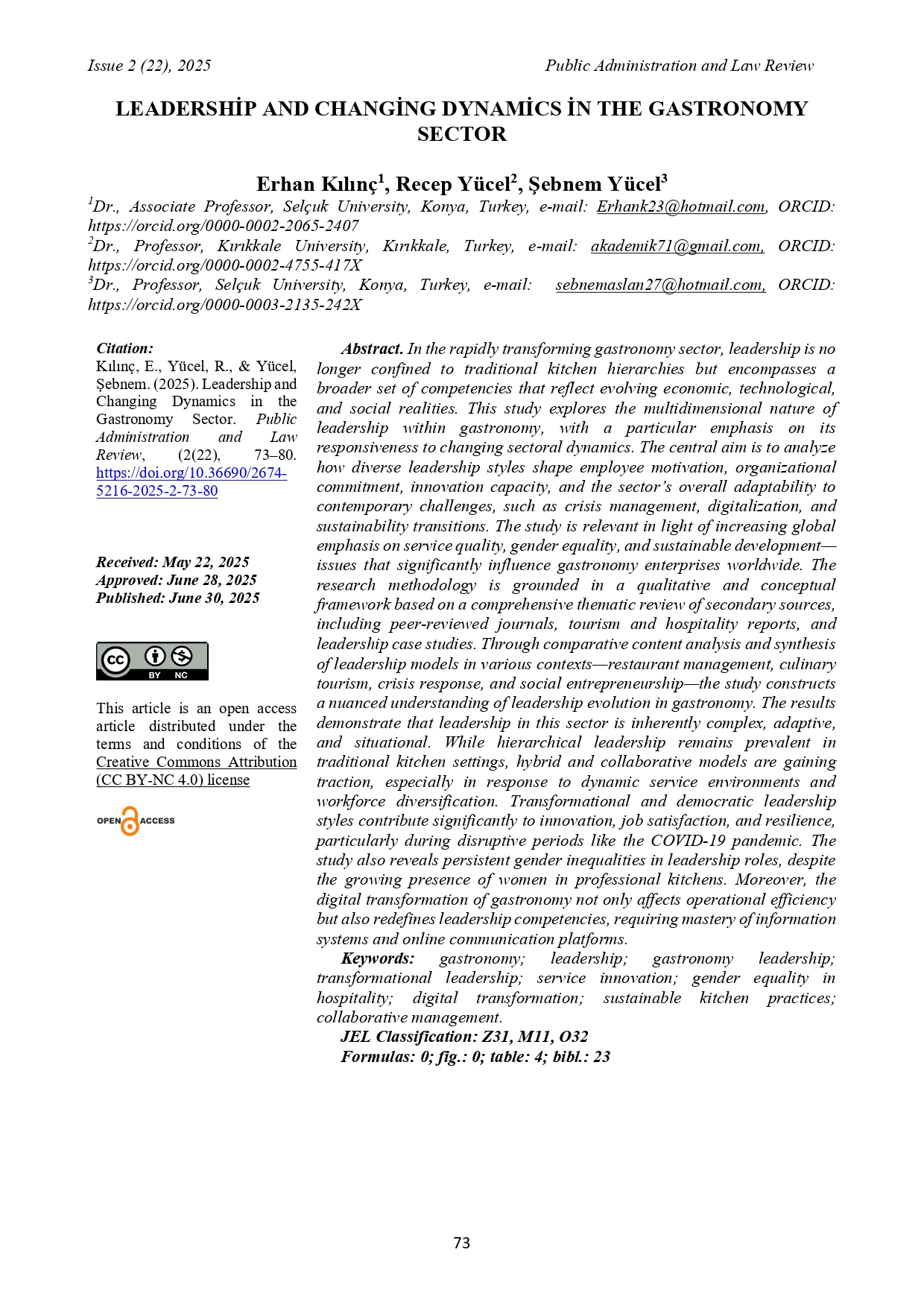LEADERSHİP AND CHANGİNG DYNAMİCS İN THE GASTRONOMY SECTOR
DOI:
https://doi.org/10.36690/2674-5216-2025-2-73-80Keywords:
gastronomy, leadership, gastronomy leadership, transformational leadership, service innovation, gender equality in hospitality, digital transformation, sustainable kitchen practices, collaborative managementAbstract
In the rapidly transforming gastronomy sector, leadership is no longer confined to traditional kitchen hierarchies but encompasses a broader set of competencies that reflect evolving economic, technological, and social realities. This study explores the multidimensional nature of leadership within gastronomy, with a particular emphasis on its responsiveness to changing sectoral dynamics. The central aim is to analyze how diverse leadership styles shape employee motivation, organizational commitment, innovation capacity, and the sector’s overall adaptability to contemporary challenges, such as crisis management, digitalization, and sustainability transitions. The study is relevant in light of increasing global emphasis on service quality, gender equality, and sustainable development—issues that significantly influence gastronomy enterprises worldwide. The research methodology is grounded in a qualitative and conceptual framework based on a comprehensive thematic review of secondary sources, including peer-reviewed journals, tourism and hospitality reports, and leadership case studies. Through comparative content analysis and synthesis of leadership models in various contexts—restaurant management, culinary tourism, crisis response, and social entrepreneurship—the study constructs a nuanced understanding of leadership evolution in gastronomy. The results demonstrate that leadership in this sector is inherently complex, adaptive, and situational. While hierarchical leadership remains prevalent in traditional kitchen settings, hybrid and collaborative models are gaining traction, especially in response to dynamic service environments and workforce diversification. Transformational and democratic leadership styles contribute significantly to innovation, job satisfaction, and resilience, particularly during disruptive periods like the COVID-19 pandemic. The study also reveals persistent gender inequalities in leadership roles, despite the growing presence of women in professional kitchens. Moreover, the digital transformation of gastronomy not only affects operational efficiency but also redefines leadership competencies, requiring mastery of information systems and online communication platforms.
Downloads
References
Alonso, A. D., O'Shea, M., & Kok, S. K. (2022). Managing knowledge in the context of gastronomy and culinary tourism: A knowledge-based perspective. Tourism Recreation Research, 47(2), 145–159. https://doi.org/10.1080/02508281.2021.1995691
Aytekin, E., & Temizkan, R. (2022). The effect of democratic leadership on organizational dissent and organizational creativity: A study on hotel businesses. Journal of Gastronomy, Hospitality and Travel, 5(3), 1105–1122.
Bennis, W. G., & Nanus, B. (1974). Leadership. University of Cincinnati.
Cinnioğlu, H. (2022). The effects of perceived autocratic and democratic leadership styles on the performance levels of employees in five-star hotels: The case of Istanbul. Journal of Tourism and Gastronomy Studies, 10(3), 1844–1866.
Duarte Alonso, A., O’Shea, M., & Kok, S. (2022). Knowledge management in culinary tourism: Leadership strategies for destination development. Journal of Gastronomy and Tourism, 7(3), 245–260.
Efe, M. N. (2021). The effect of transformational leadership on job satisfaction and organizational commitment in accommodation businesess. Journal of Tourism and Gastronomy Studies, 9(3), 2092–2108.
Gandolfi, F., & Stone, S. (2018). Leadership, leadership styles, and servant leadership. Journal of Management Research, 18(4), 261–269.
Garcia-Henche, B., & Cuesta-Valiño, P. (2022). Increasing the visibility of women in gastronomy. International Journal of Gastronomy and Food Science, 30, Article 100345. https://doi.org/10.1016/j.ijgfs.2022.100345
Hughes, R., Ginnett, R. C., & Curphy, G. J. (1996). Leadership. Irwin.
Kayaplı Yıldırım, S. (2020). The mediating role of transformational leadership in the effect of knowledge sharing on innovative work behavior in hotel enterprises. Journal of Tourism and Gastronomy Studies, 8(1), 137–157.
Lortie, J., Cabantous, L., & Sardais, C. (2022). How leadership moments are enacted within a strict hierarchy: The case of kitchen brigades in haute cuisine restaurants. Organization Studies, 44, 1081–1101. https://doi.org/10.1177/01708406221134225
Navarro-Dols, S., & González-Pernía, J. L. (2024). Social entrepreneurship in gastronomy: Examining the role of participants in leadership and financial structuring. International Journal of Hospitality Management, 104, Article 103317.
Putra, E., & Cho, S. (2019). Characteristics of small business leadership from employees’ perspective: A qualitative study. International Journal of Hospitality Management. https://doi.org/10.1016/j.ijhm.2018.11.011
Rodgers, S. (2008). Technological innovation supporting different food production philosophies in the food service sectors. International Journal of Contemporary Hospitality Management, 20(1), 19–34.
Rodgers, S. (2009). The state of technological sophistication and the need for new specialised tertiary degrees in food services. International Journal of Hospitality Management, 28(1), 71–77.
Sharma, S. (2014). Sustainable culinary practices. In Managing sustainability in the hospitality and tourism industry: Paradigms and directions for the future (pp. 303–334).
Silva, A. (2016). What is leadership? Journal of Business Studies Quarterly, 8(1), 1.
Sökmen, A., & Yavanoğlu, Ş. I. (2023). The relationship between visionary leadership, organizational commitment and job performance: A study on hotel employees. Journal of Tourism and Gastronomy Studies, 11(2), 1561–1580.
Taha, A. Z., & Nee Ng, C. Y. (2019). Service quality and gastronomy. In The Routledge Handbook of Gastronomic Tourism (pp. 125–133).
Tirtawati, N., & Wulandari, P. (2023). Local’s participation in evolving gastronomy tourism in Ubud and beyond. TRJ Tourism Research Journal, 7(1). https://doi.org/10.30647/trj.v7i1.208
Türkmendağ, T., & Karaman, N. (2024). Gender inequality in the culinary profession in the tourism sector from the perspective of university students with work experience in the culinary sector. Frontiers in Sociology, 9, Article 1234567. https://doi.org/10.3389/fsoc.2024.1234567
Wellton, L., Jonsson, I., & Svingstedt, A. (2019). “Just trained to be a chef, not a leader”: A study of head chef practices. International Journal of Hospitality & Tourism Administration, 20, 400–422. https://doi.org/10.1080/15256480.2017.1397584
Yilmaz, I., & Beyter, N. (2021). Changes in measures taken in food and beverage units in terms of food safety after COVID-19. Journal of Tourism and Gastronomy Studies, 9(4), 321–346.

Downloads
Published
How to Cite
Issue
Section
License

This work is licensed under a Creative Commons Attribution-NoDerivatives 4.0 International License.





